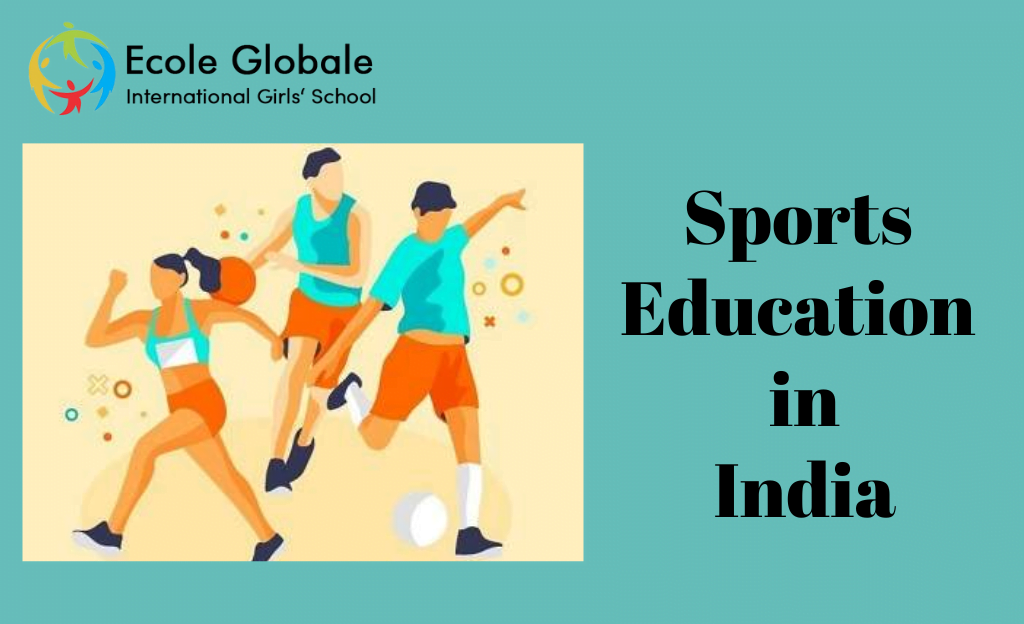Sports education in India primarily focuses on children and adolescents, as they are considered to be at a critical stage in their lives where they can make good decisions or bad decisions regarding their health and fitness levels. As per research conducted by the best International Schools In India, It is also important for adults because many adults lack motivation when it comes to exercising or eating right; this program can help them achieve their goals.
Sports education in India is not just about teaching students how to play sports; it also teaches them how to manage their time wisely so they can practice playing sports regularly. The program helps students develop skills such as teamwork and leadership, which are essential for any workplace environment. Sports education In India allows students to learn about themselves and others, which helps them build confidence when interacting with others through various activities such as dances and games played during recess time or after school hours.
Importance of Sports Education in India
Sports education in India is gaining ground as more and more people are becoming aware of the importance of sports in improving physical fitness.
In a nation like ours, where there’s hardly any time for one to practice sports or exercise properly, it becomes extremely important to start with some form of sports education at a young age. Sports education in India can be taken up as a subject at various levels. From primary school level right up till post-graduation, you’ll find a course that suits your needs.
It is growing rapidly and has become an integral part of the curriculum for students across all age groups. Students who have participated in sports have been found to have better performance both academically and professionally.
Sports education in India imparts knowledge about different types of sports – their history, rules and regulations, strategies, etc., which helps students understand the importance of playing fair while enjoying their favorite games.
Current Scenario of Sports Education in India

Another survey done by Best Schools in India shows that Sports education in India is at a nascent stage. There are very few institutions that offer sports education in India. Sports education in India has faced a lot of criticism from various quarters over the years. There are many reasons for this but the most important ones are the lack of proper infrastructure and the lack of funds. It is also important to understand that sports education in India has always been looked upon as an optional subject by most parents till recently when they started realizing its importance.
The government has also taken several steps to promote sports education and encourage young people to take up this career path. There are many institutes and universities where you can learn about different types of games and how to become successful at them. Many academies offer courses for those who want to become professional players, coaches, or referees for any sport.
To promote sports among children, the government has introduced various schemes. However, these schemes haven’t been able to achieve their objective due to some factors like lack of adequate funding, lack of proper infrastructure, etc.
India is a country of sports fans. When it comes to sports, we have been witnessing a lot of development in the last few years. It is because there has been an increase in the number of people interested in participating in different sports. However, what’s more, important is the fact that there has also been a rise in the number of people who wish to become professionals in this field.
Challenges faced by the sports education system
Sports education in India is facing many challenges such as a lack of infrastructure, poor awareness, lack of support from the government and private players, etc., which are hindering its growth in India.
The lack of proper infrastructure has affected the proper training of athletes. A good example is seen in football, where most of the stadiums in India are not suitable for practice and matches. In addition to this, there are very few synthetic pitches available in India.
Another major hurdle faced by sports education in India is the lack of coordination between various institutions and departments. This lack of coordination affects the overall development of athletes, as they have to juggle between different institutions and departments may not be in sync with each other.
Another challenge faced by the Indian sports education system is poor coaches who lack knowledge about various techniques used in different games like hockey, football, etc. It is because these coaches have to face many problems due to a lack of proper coaching techniques which make them unable to give good performance to their students at international events like the Olympics etc.
Private Sector Participation in Sports Education in India

The sports education industry in India has been growing by leaps and bounds over the last few years, with several new players entering this space. The increasing popularity of sports among people has led to an increase in the number of private players focusing on providing sports education. The private sector has been playing an important role in sports education in India.
The key factors driving this growth are:
- Increasing awareness about physical fitness among people.
- Increased participation by youth in sports activities such as football, cricket, hockey, badminton, etc.
- Rising demand for personal trainers from corporates and individuals.
Many private companies have been involved in the development of sports infrastructure, training coaches and athletes, conducting seminars/workshops, and creating awareness about the importance of sports among youth and adults alike.
Advantages and disadvantages of private sector participation
The most significant advantage of private sector participation is that it increases competition between companies that want better results from their athletes and teams. As a result, these companies will invest more money into training programs for athletes which will increase their ability levels which will ultimately result in better performance at competitions such as national championships or international events such as Olympic Games.
The main advantage of private sector participation is that they can bring more resources into the sport than what the government alone can provide.
Another advantage is that they can train athletes who are not able to afford training at universities or other places like this due to financial constraints. It means that even those who do not have money can still get good training which will help them become better athletes and also possibly better professionals later on in life if they are lucky enough to make it big!
Disadvantages:
Lack of coordination between different organizations and institutes: There are many organizations and institutes in the country that offer sports education to students. However, these institutes do not coordinate with each other on certain issues like syllabus and admission criteria. As a result, there is a lack of consistency between these institutions and thus it becomes difficult for parents to choose an appropriate institute for their children. It can be solved by making proper regulations regarding admission criteria, syllabus, etc., by all these institutions so that they can work together as a single unit instead of being isolated from each other.
High fee structure:
The private sector generally charges high fees to students since they need to pay their maintenance costs, salaries of teachers, etc. Therefore it becomes difficult for poor families who cannot afford such high fees to send their children.
Role of Sports Education in Developing Professional Athletes

Sports education is an important part of the development of a sportsperson. It is the first step towards building a career in any sport. It plays an important role in developing the personality of an athlete and helps them make their mark in the world of sports.
Sports education aims at imparting not only athletic skills but also other life skills such as discipline, focus and concentration, self-esteem, and confidence to help children become better human beings.
Sports education programs are conducted at schools and colleges across India to develop sports talent at the grassroots level. Students who have participated in these programs have gone on to represent India in international competitions such as the Olympics, Commonwealth Games, etc.
Conclusion
This growing networking sports business has started to impact the sports education market. The number of players is also increasing in this segment due to the attractive packages offered by these academies and training centers. Although a few players in the field have made some promising strides, there is a lot of room for other businesses seeking growth.
For any queries related to parenting, schooling, or any students-related tips, click here to check out our latest blogs.






